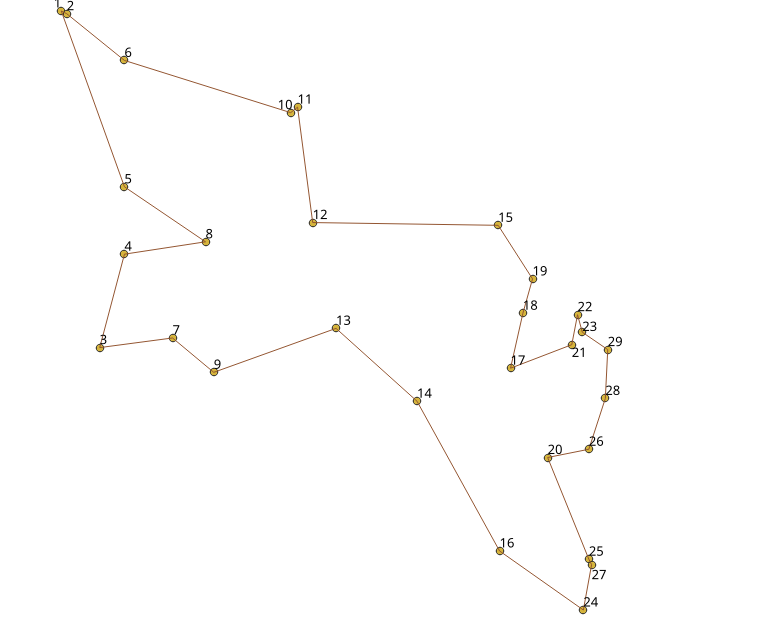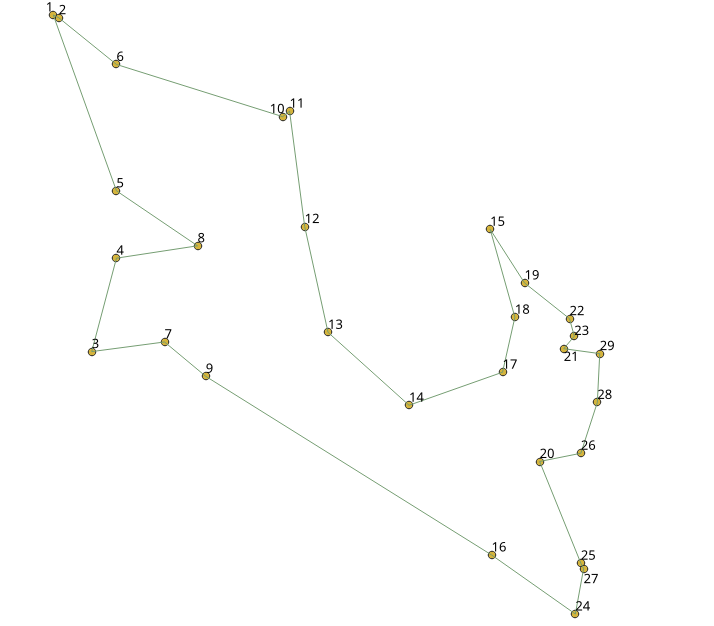Unsupported versions:2.6 2.5 2.4 2.3
pgr_TSPeuclidean¶
pgr_TSPeuclidean- Approximation using metric algorithm.
Availability:
Version 3.2.1
Using Boost: metric TSP approx
Simulated Annealing Algorithm no longer supported
The Simulated Annealing Algorithm related parameters are ignored: max_processing_time, tries_per_temperature, max_changes_per_temperature, max_consecutive_non_changes, initial_temperature, final_temperature, cooling_factor, randomize
Version 3.0.0
Name change from pgr_eucledianTSP
Version 2.3.0
New official function.
Description¶
Problem Definition¶
The travelling salesperson problem (TSP) asks the following question:
Given a list of cities and the distances between each pair of cities, which is the shortest possible route that visits each city exactly once and returns to the origin city?
Characteristics¶
This problem is an NP-hard optimization problem.
Metric Algorithm is used
Implementation generates solutions that are twice as long as the optimal tour in the worst case when:
Graph is undirected
Graph is fully connected
Graph where traveling costs on edges obey the triangle inequality.
On an undirected graph:
The traveling costs are symmetric:
Traveling costs from
utovare just as much as traveling fromvtou
Any duplicated identifier will be ignored. The coordinates that will be kept is arbitrarily.
The coordinates are quite similar for the same identifier, for example
1, 3.5, 1 1, 3.499999999999 0.9999999
The coordinates are quite different for the same identifier, for example
2, 3.5, 1.0 2, 3.6, 1.1
Signatures¶
Summary
[start_id, end_id])(seq, node, cost, agg_cost)- Example:
With default values
SELECT * FROM pgr_TSPeuclidean(
$$
SELECT id, st_X(geom) AS x, st_Y(geom)AS y FROM vertices
$$);
seq | node | cost | agg_cost
-----+------+----------------+---------------
1 | 1 | 0 | 0
2 | 6 | 2.2360679775 | 2.2360679775
3 | 5 | 1 | 3.2360679775
4 | 10 | 1.41421356237 | 4.65028153987
5 | 7 | 1.41421356237 | 6.06449510225
6 | 2 | 2.12132034356 | 8.18581544581
7 | 9 | 1.58113883008 | 9.76695427589
8 | 4 | 0.5 | 10.2669542759
9 | 14 | 1.58113883009 | 11.848093106
10 | 17 | 1.11803398875 | 12.9661270947
11 | 16 | 1 | 13.9661270947
12 | 15 | 1 | 14.9661270947
13 | 11 | 1.41421356237 | 16.3803406571
14 | 13 | 0.583095189485 | 16.9634358466
15 | 12 | 0.860232526704 | 17.8236683733
16 | 8 | 1 | 18.8236683733
17 | 3 | 1.41421356237 | 20.2378819357
18 | 1 | 1 | 21.2378819357
(18 rows)
Parameters¶
Parameter |
Type |
Description |
|---|---|---|
|
Coordinates SQL as described below |
TSP optional parameters¶
Column |
Type |
Default |
Description |
|---|---|---|---|
|
ANY-INTEGER |
|
The first visiting vertex
|
|
ANY-INTEGER |
|
Last visiting vertex before returning to
|
Inner Queries¶
Coordinates SQL¶
Column |
Type |
Description |
|---|---|---|
|
|
Identifier of the starting vertex. |
|
|
X value of the coordinate. |
|
|
Y value of the coordinate. |
Result columns¶
Returns SET OF (seq, node, cost, agg_cost)
Column |
Type |
Description |
|---|---|---|
seq |
|
Row sequence. |
node |
|
Identifier of the node/coordinate/point. |
cost |
|
Cost to traverse from the current
|
agg_cost |
|
Aggregate cost from the
|
Additional Examples¶
Test 29 cities of Western Sahara¶
This example shows how to make performance tests using University of Waterloo’s example data using the 29 cities of Western Sahara dataset
Creating a table for the data and storing the data¶
CREATE TABLE wi29 (id BIGINT, x FLOAT, y FLOAT, geom geometry);
INSERT INTO wi29 (id, x, y) VALUES
(1,20833.3333,17100.0000),
(2,20900.0000,17066.6667),
(3,21300.0000,13016.6667),
(4,21600.0000,14150.0000),
(5,21600.0000,14966.6667),
(6,21600.0000,16500.0000),
(7,22183.3333,13133.3333),
(8,22583.3333,14300.0000),
(9,22683.3333,12716.6667),
(10,23616.6667,15866.6667),
(11,23700.0000,15933.3333),
(12,23883.3333,14533.3333),
(13,24166.6667,13250.0000),
(14,25149.1667,12365.8333),
(15,26133.3333,14500.0000),
(16,26150.0000,10550.0000),
(17,26283.3333,12766.6667),
(18,26433.3333,13433.3333),
(19,26550.0000,13850.0000),
(20,26733.3333,11683.3333),
(21,27026.1111,13051.9444),
(22,27096.1111,13415.8333),
(23,27153.6111,13203.3333),
(24,27166.6667,9833.3333),
(25,27233.3333,10450.0000),
(26,27233.3333,11783.3333),
(27,27266.6667,10383.3333),
(28,27433.3333,12400.0000),
(29,27462.5000,12992.2222);
Adding a geometry (for visual purposes)¶
UPDATE wi29 SET geom = ST_makePoint(x,y);
Total tour cost¶
Getting a total cost of the tour, compare the value with the length of an optimal tour is 27603, given on the dataset
SELECT *
FROM pgr_TSPeuclidean($$SELECT * FROM wi29$$)
WHERE seq = 30;
seq | node | cost | agg_cost
-----+------+---------------+---------------
30 | 1 | 2266.91173136 | 28777.4854127
(1 row)
Getting a geometry of the tour¶
WITH
tsp_results AS (SELECT seq, geom FROM pgr_TSPeuclidean($$SELECT * FROM wi29$$) JOIN wi29 ON (node = id))
SELECT ST_MakeLine(ARRAY(SELECT geom FROM tsp_results ORDER BY seq));
st_makeline
--------------------------------------------------------------------------------------------------------------------------------------------------------------------------------------------------------------------------------------------------------------------------------------------------------------------------------------------------------------------------------------------------------------------------------------------------------------------------------------------------------------------------------------------------------------------------------------------------------------------------------------------------------------------------------------------------------------------------------------------------------------------------------------------------------------------------------------------------------------------------------------------------------------------------------------------------------------------------------------------------------------------
01020000001E000000F085C9545558D4400000000000B3D040000000000069D440107A36ABAAAAD040000000000018D54000000000001DD040107A36AB2A10D7401FF46C5655FDCE40000000000025D740E10B93A9AA1ECF40F085C954D552D740E10B93A9AA62CC40107A36ABAA99D7400000000000E1C940107A36AB4A8FD840E10B93A9EA26C840F085C954D5AAD9401FF46C5655EFC840F085C95455D0D940E10B93A9AA3CCA40F085C9545585D940000000000052CC400000000080EDD94000000000000DCB40A52C431C0776DA40E10B93A9EA33CA40A52C431C6784DA40E10B93A9AAC9C940A52C431C8764DA402C6519E2F87DC94000000000A0D1DA4096B20C711C60C940F085C95455CADA40000000000038C840F085C9545598DA40E10B93A9AA03C740F085C954551BDA40E10B93A9AAD1C640F085C9545598DA40000000000069C440107A36ABAAA0DA40E10B93A9AA47C440107A36ABAA87DA40E10B93A9AA34C340000000008089D94000000000009BC440F085C954D526D6401FF46C5655D6C840F085C954D5A9D540E10B93A9AAA6C9400000000000CDD4401FF46C56556CC940000000000018D5400000000000A3CB40F085C954D50DD6400000000000EECB40000000000018D5401FF46C56553BCD40F085C9545558D4400000000000B3D040
(1 row)
Visual results¶
Visually, The first image is the optimal solution and the second image
is the solution obtained with pgr_TSPeuclidean.


See Also¶
Indices and tables
